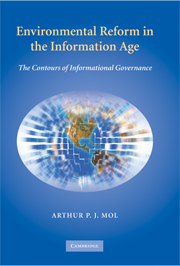Book contents
- Frontmatter
- Contents
- Tables, figures and boxes
- Preface
- Introduction: new frontiers of environmental governance
- Part I Theory
- Part II Praxis
- 5 Monitoring, surveillance and empowerment
- 6 Environmental state and information politics
- 7 Greening the networked economy
- 8 Environmental activism and advocacy
- 9 Media monopolies, digital democracy, cultural clashes
- 10 Information-poor environments: Asian tigers
- Part III Conclusion
- References
- Index
8 - Environmental activism and advocacy
Published online by Cambridge University Press: 03 November 2009
- Frontmatter
- Contents
- Tables, figures and boxes
- Preface
- Introduction: new frontiers of environmental governance
- Part I Theory
- Part II Praxis
- 5 Monitoring, surveillance and empowerment
- 6 Environmental state and information politics
- 7 Greening the networked economy
- 8 Environmental activism and advocacy
- 9 Media monopolies, digital democracy, cultural clashes
- 10 Information-poor environments: Asian tigers
- Part III Conclusion
- References
- Index
Summary
A natural alliance in transition
On 19 August 2006, a ship called the Probo Koala – chartered by the International petroleum trader Trafigura LTD and controlled by the Dutch firm Trafigura Beheer BV – unloaded more than five hundred tonnes of toxic waste in Abidjan, the main economic capital of Ivory Coast in western Africa. Before that, it tried already to unload its waste in the port of Amsterdam, but waste treatment proved to be too expensive (around US$250,000) and too slow (leading to another US$250,000 loss following late arrivals). The ship moved to the western coast of Africa where it could unload its toxic waste at a waste processing company calle Societé Tommy, which was established just a few days earlier for only this purpose at a price of around US$15,000. The toxic waste was subsequently dumped at more than ten sites in the African city, leading to medical treatment of thousands of victims with symptoms including respiratory problems, nausea, dizziness, vomiting (including throwing up blood), burns and irritation. Following local media reporting on these symptoms, local unrest started. It was not until the first week of September 2006 that the incident became globally known through the networks of activists and media. The Ministry of Health of Ivory Coast announced an extraordinary meeting that led to the dismissal of its government in September 2006, to be replaced by almost the same cabinet a few days later (only the ministers for Transport and Environment were replaced).
- Type
- Chapter
- Information
- Environmental Reform in the Information AgeThe Contours of Informational Governance, pp. 189 - 211Publisher: Cambridge University PressPrint publication year: 2008



